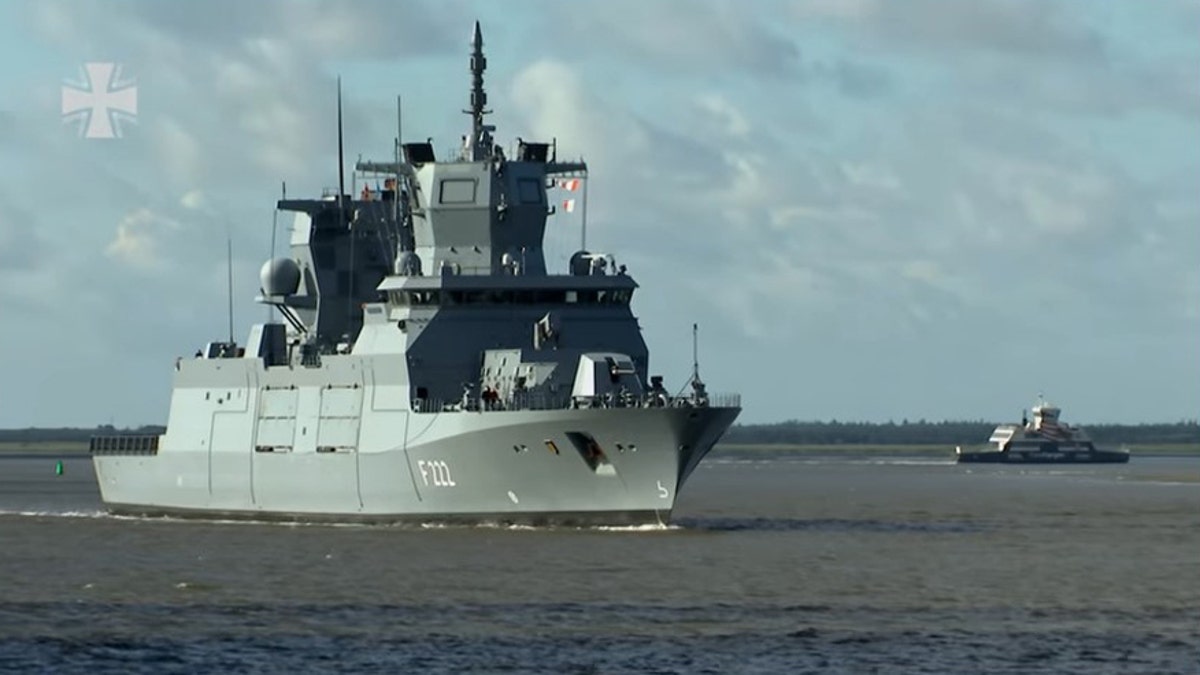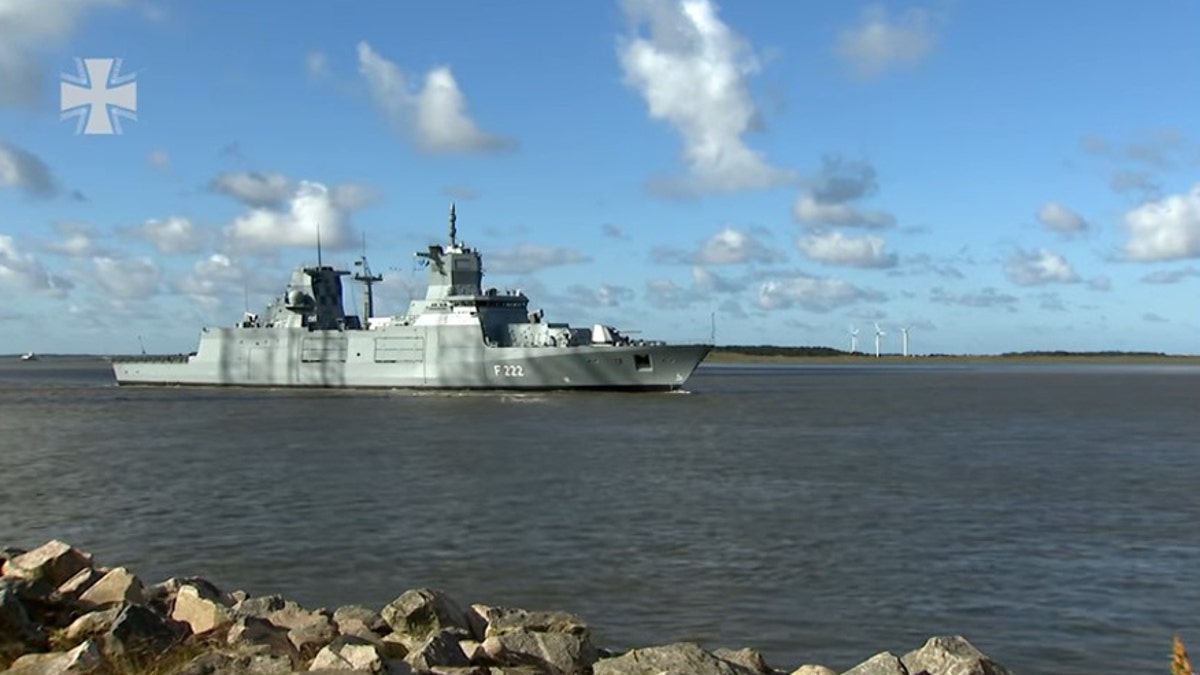
The German Navy's new frigate, the Baden-Württemberg (Bundeswehr/YouTube screenshot)
The German Navy’s latest multimillion-dollar warship, the Baden-Württemberg, is battling delays and technology challenges.
The Baden-Württemberg is the first of four new F-125 class frigates ordered by the Bundeswehr, the German military, with a total price tag of around €2 billion ($2.44 billion).
Citing the German Navy, The Wall Street Journal reports that the ship’s central computer system has not passed the necessary tests. The ship, which has been undergoing sea trials, returned to port last week, enabling the unspecified technology issues to be resolved.
“We are confident that we will be able to promptly solve the current problems with the IT-infrastructure thanks to our proven experience in the construction of complex naval vessels,” according to a spokesman for Thyssenkrupp, the company leading the ARGE F125 consortium bulding the ships.
ROBOT PATROL: ISRAELI ARMY TO DEPLOY AUTONOMOUS VEHICLES ON GAZA BORDER
“For the frigate 125 ‘Baden-Württemberg’, necessary revisions have led to delays in the trials to prove its operability,” he explained. “These trials are mainly carried out at sea and require extensive support and resources from all project participants.”

The German Navy's new frigate, the Baden-Württemberg (Bundeswehr/YouTube screenshot)
With a wealth of new technology on board, experts are still fine-tuning the frigate. “The frigate class 125 is a newly designed, technically sophisticated ship with highly complex new developments -- including new technologies. With regard to such a major project, delays can never be completely ruled out,” the Thyssenkrupp spokesman told Fox News.
The ship, which displaces around 7,000 tons, was delivered for sea trials in 2016 after a series of delays, according to The Journal. Designed to stay at sea for up to two years, the F-125 frigates will eventually replace the German Navy’s eight ‘Bremen’ type 122-class frigates.
The Baden-Württemberg is expected to be handed over to the Federal Office of Bundeswehr Equipment, Information Technology and In-Service Support (BAAINBw) this year, according to Thyssenkrupp's spokesman and the German military.
ARMY TESTS HIGH-TECH AIRDROP SYSTEM THAT 'SEES' ITS TARGET
"From mid-January, the ship will be deployed to the shipyard in Hamburg for troubleshooting activities and elimination of open items to be carried out by the ARGE F125 consortium," explained a spokesman for the BAAINBw, in a statement emailed to Fox News. "After the shipyard period, the ship will undergo the remaining acceptance trials so that final acceptance by BAAINBw can take place in 2018. Any lessons learned will be applied to the sister ships."
The spokesman noted that about 90 percent of the components on the Baden-Württemberg are new. "It was an enormous challenge for the manufacturers to integrate the various systems and to fulfil the increased reliability requirements associated with intensive use," he explained, via email. "All systems must operate reliably even under extreme conditions to ensure full operational capability. For this purpose, BAAINBw subjects the ship to extensive acceptance trials."
Troubleshooting the IT problems, however, can be a tough task. "All software and hardware faults of the IT systems used on the ship must be eliminated so that all outstanding acceptance trials can be carried out," explained the spokesman. "Such defects are often found at interfaces between the subsystems, which makes their analysis more difficult. An increased failure rate of power supply units may, for example, be attributed to the components themselves, but it may also be caused by a faulty power supply."
"BAAINBw expects delivery to be in accordance with the contract," he added. "Any agreed penalties will be consistently applied."
Thanks to its sophisticated technology, the F-125s will utilize a much smaller crew than the 122-class ships. The new frigates will each have a regular crew of 120, but can support a maximum crew of 190. The 122 class frigates each have a crew of 203 plus 20 additional helicopter crew, according to Naval Technology.
The F-125s are also designed to support a “two-crew” model, where the complete crew can be changed in mid-deployment.
Citing the German newspaper Kieler Nachrichten, The Journal reports that the Baden-Württemberg experienced problems with its radar, electronics and the flameproof coating on its fuel tanks. During its sea trials, the frigate was also found to list slightly to its starboard side, although this is being resolved.
"The list to starboard of the Baden-Württemberg will be corrected during the first planned deployment to the shipyard by the ARGE F125 consortium," explained the BAAINBw spokesman. "The list has no impact on the remaining acceptance trials. The correction of the list is taken into account during the construction of the other sister ships which are currently being built," he said.
Critics have also questioned whether the German military ordered the Baden-Württemberg without the necessary weaponry needed for anti-submarine warfare. The vessel, according to The Wall Street Journal, lacks the sonar and torpedo tubes found on the 122-class frigates.
HIGH-TECH 'BAZOOKA' FIRES A NET TO TAKE DOWN DRONES
Despite the delays experienced by the Baden-Württemberg, the consortium delivering the F-125 project expects to hand over the three additional frigates; the ‘Nordrhein-Westfalen,’ the ‘Sachsen-Anhalt’ and the ‘Rheinland-Pfalz,’ on time. “The Nordrhein-Westfalen has successfully completed its ship-related technical trials. Currently the combat system is being tested. The delivery of the Nordrhein-Westfalen to the BAAINBw is also planned for 2018,” explained the Thyssenkrupp spokesman, in an email to Fox News. “The frigate Sachsen-Anhalt is planned to be handed over in the year 2019 and the Rheinland-Pfalz in the year 2020.”
This story has been updated with comments from the BAAINBw.
Follow James Rogers on Twitter @jamesjrogers
